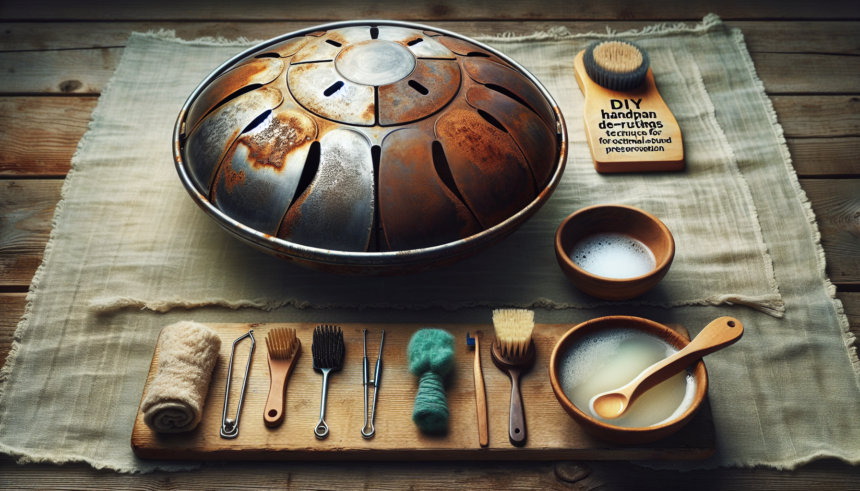The handpan is an exquisite musical instrument cherished by many for its ethereal sounds and rhythmic harmonics. However, like any metallic instrument, it is prone to rust, which can adversely affect its sound quality and longevity. In this guide, we will delve into various DIY handpan de-rusting techniques that can help you maintain the optimal sound quality of your handpan.
Understanding Rust on Handpans
Rust is the result of iron reacting with oxygen and moisture. Over time, exposure to elements can cause even the most durable metals to corrode. Handpans, typically made of nitrided steel or stainless steel, can still fall victim to rusting if not properly maintained. Rust can compromise the integrity of the instrument and alter its unique acoustic properties.
Necessary Tools and Materials
Before diving into the de-rusting techniques, let’s gather some essential tools and materials:
- Soft microfiber cloths
- Oils (e.g., mineral oil, coconut oil, or specialized handpan oil)
- Rust remover (can be homemade or commercial)
- Fine steel wool or a soft brush
- Painters’ masking tape (optional)
- Protective gloves
Step-by-Step De-Rusting Techniques
1. Initial Cleaning
Before beginning any rust removal, it’s important to clean your handpan properly:
- Use a soft microfiber cloth to gently wipe down the entire surface, removing any dust and loose debris.
- Avoid abrasive materials that may scratch or damage the surface of the handpan.
2. Assessing the Rust
Carefully examine the extent of the rust. Based on how severe the rusting is, you might choose a different technique:
- Light Surface Rust: Usually, this can be cleaned fairly easily with mild abrasives.
- Moderate to Severe Rust: These cases often require more intensive treatments and care to avoid damaging the sound quality of the handpan.
3. Using a Rust Remover
There are several rust removers available commercially, but you can also create your own. Here’s how you can use them:
- Commercial Rust Removers: Follow the manufacturer’s instructions carefully. Apply the product on the rusty areas and let it sit for the recommended duration.
- DIY Rust Removers: You can make a paste using baking soda and water. Apply this mixture to the rusted area and let it sit for about an hour before scrubbing.
4. Scrubbing the Rust Away
Use fine steel wool or a very soft brush to gently scrub the rusted areas:
- Perform this action delicately to avoid scratching the surface.
- Wipe away any residue with a clean microfiber cloth.
5. Final Cleaning
After removing the rust, it’s crucial to thoroughly clean the handpan to wipe off any remnants:
- Use a clean microfiber cloth moistened with water to wipe the entire surface.
- Dry thoroughly to ensure no moisture is left on the handpan.
6. Oiling the Handpan
Oiling is a vital step in protecting your handpan from future rust:
- Use a light coat of mineral oil, coconut oil, or specialized handpan oil.
- Apply the oil evenly across the entire surface using a clean microfiber cloth.
- Ensure the oil penetrates into any niches or crevices where rust might develop.
7. Routine Maintenance
Preventative maintenance is the best way to keep your handpan rust-free:
- Regularly wipe down your handpan with a clean cloth to remove any moisture.
- Periodically reapply oil to protect against rust.
- Store the handpan in a cool, dry place and use a protective case or cover when not in use.
Conclusion
With proper care and maintenance, your handpan can continue to produce its mesmerizing sounds for many years. By implementing these DIY de-rusting techniques, you can preserve the instrument’s integrity and enhance its longevity. Remember, the key to a rust-free handpan lies in regular inspection, cleaning, and preventative care. Treat your handpan with the respect and attention it deserves, and it will reward you with its beautiful, unique tones.
FAQs
1. How often should I clean and oil my handpan?
It’s advisable to clean and oil your handpan at least once a month, or more frequently if you play it regularly. Always wipe it down after each use to remove any sweat or moisture that can accelerate rusting.
2. Can I use any oil for my handpan?
While mineral oil, coconut oil, and specialized handpan oil are recommended, avoid using oils that are too thick or sticky, as they can attract dust and debris. Test any new oil on a small area first to ensure it doesn’t adversely affect the instrument.
3. What should I do if my handpan develops severe rust?
If your handpan exhibits severe rust, it might be best to consult a professional for restoration. Intensive rust might require specialized tools and expertise to avoid damaging the instrument further.
4. Can I use commercial rust removers on my handpan?
Yes, but ensure they are safe for use on musical instruments and follow the manufacturer’s instructions carefully. Always test on a small, inconspicuous area first to ensure it doesn’t damage the finish.
5. How can I prevent rust from forming on my handpan?
Preventive measures include regular cleaning and oiling, storing the handpan in a cool, dry place, and using a protective case. Avoid exposing the handpan to excessive moisture and always dry it thoroughly after use.





